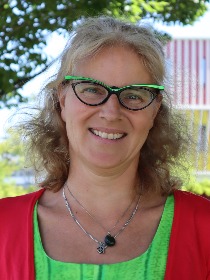Opinie | Het platteland is niet maakbaar

We hebben lang gedacht dat Nederland, en dus het platteland maakbaar was. Maar nu vraagstukken over klimaatverandering en energietransitie steeds dichterbij komen, bereiken we de grens van de maakbaarheid, zegt Tialda Haartsen , hoogleraar Rurale Geografie bij de Rijksuniversiteit Groningen. En dat betekent dat we anders om moeten gaan met de inrichting van het platteland.
Opgetekend door Marrit Wouda, Corporate Communicatie RUG
Maakbaar land
‘Tot nu toe dachten we vaak: we kunnen elk plattelandsgebied geschikt maken voor allerlei activiteiten, ook als de bodem niet helemaal geschikt is. We regelen de grondwaterstand, gebruiken kunstmest en pesticiden waar dat nodig is met als resultaat dat overal goed geboerd kan worden. Maar we lopen nu tegen de grens van die maakbaarheid aan. Een lage grondwaterstand is handig voor boeren, zij kunnen dan optimaal gewassen telen of al in het vroege voorjaar hun mest uitrijden. Maar een deel van Nederland komt steeds verder onder zeeniveau te liggen en de zomers worden steeds droger. Hierdoor ontstaat er grote schade aan de natuur en zijn grote gebieden minder geschikt voor bebouwing. We moeten dus af van dat maakbare ideaal en ons laten inspireren door hoe men vroeger in balans met natuurlijke processen leefde. Natuurlijk is de wereld heel anders dan vroeger, maar we moeten wél op zoek naar nieuwe ordenende principes waarmee we op een 21e-eeuwse manier de bodem en het water leidend kunnen laten zijn.’
Vrijwilligers en voorzieningen
‘Maar, het platteland is meer dan alleen landbouwgrond. Er wonen ook mensen in kleine gemeenschappen. Die worden door de trek van jonge mensen naar de stad nog harder geraakt door vergrijzing. Daar komt bij dat juist op het platteland veel voorzieningen staan of vallen met vrijwilligers. Enkele decennia terug was het goed haalbaar om naast het runnen van een gezin onbetaalde arbeid voor de gemeenschap te verrichten. Bijvoorbeeld omdat er maar één ouder buitenshuis werkte. In de huidige maatschappij is dat voor veel mensen steeds moeilijker, waardoor het meeste vrijwilligerswerk nu bij gepensioneerden ligt. Wanneer hun gezondheid verslechtert, kunnen zij dit werk niet meer doen en hierdoor komen voorzieningen onder druk te staan.’
Maakbaarheid van de dorpsgemeenschap
‘Het huidige beleid gaat ook van een zekere maakbaarheid van de dorpsgemeenschap. De gedachte is dat wanneer er in een dorp behoefte is aan voorzieningen, dat die dan wel zullen ontstaan. Bijvoorbeeld via vrijwilligers die een zorginitiatief, een sportvoorziening of een bibliotheek opstarten. Behalve dat deze vrijwillige arbeid voor veel mensen een grote aanslag doet op hun tijd, moeten zo’n burgerinitatief vervolgens ook nog om subsidiepotjes concurreren. De vraag is of dat geld niet veel beter direct door de gemeente in algemene voorzieningen gestoken kan worden.’
Op naar samenhangend beleid
‘Het platteland is dus niet zo maakbaar als we dachten en er staan veel ruimtelijke veranderingen op til. Bovendien is het platteland te lang, te veel buiten beeld geweest. Het beeld is dat de stad dynamisch is, de stad is de place to be, als je succesvol wilt zijn moet je naar de stad. Daardoor zijn we vergeten dat de stad niet bestaat zonder het platteland. Het is tijd om samen op zoek te gaan naar de nieuwe ordenende principes voor een leefbaar en werkbaar platteland.’
Rural Geographies congres
Tialda Haartsen is hoofdorganisator van het 3e Rural Geographies congres dat van 26 tot 29 juni 2023 plaats zal vinden. Vanuit heel Europa komen er academici en beleidsmakers naar Groningen om te praten over leefbaarheid, energietransitie, klimaatverandering en een langetermijnvisie voor rurale gebieden. De keynotes zijn onder andere van Johan Osinga, directeur-generaal van het ministerie van LNV, en Alexia Rouby
Meer nieuws
-
01 december 2025
De kracht van beweging
